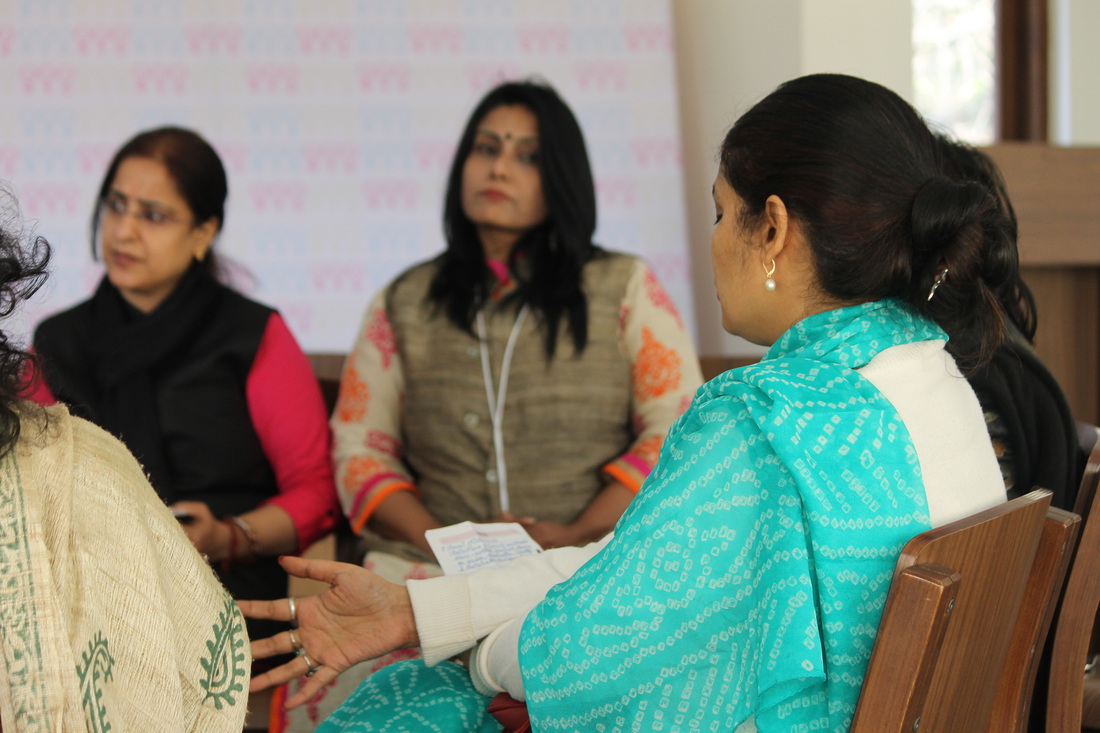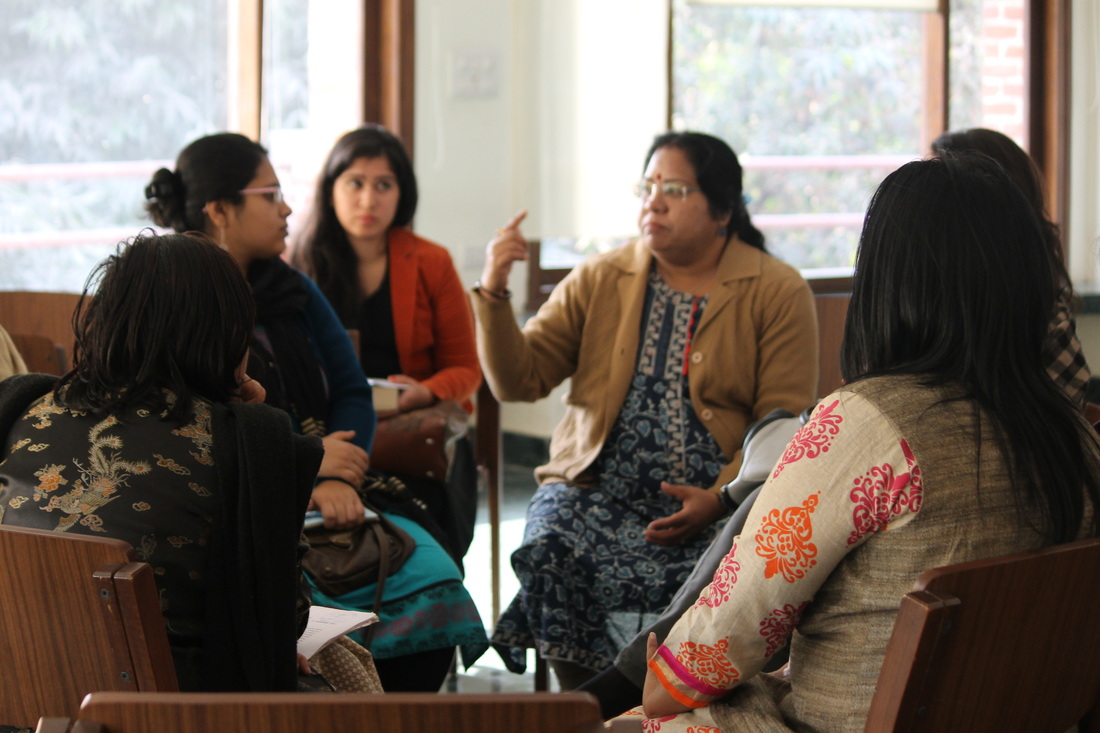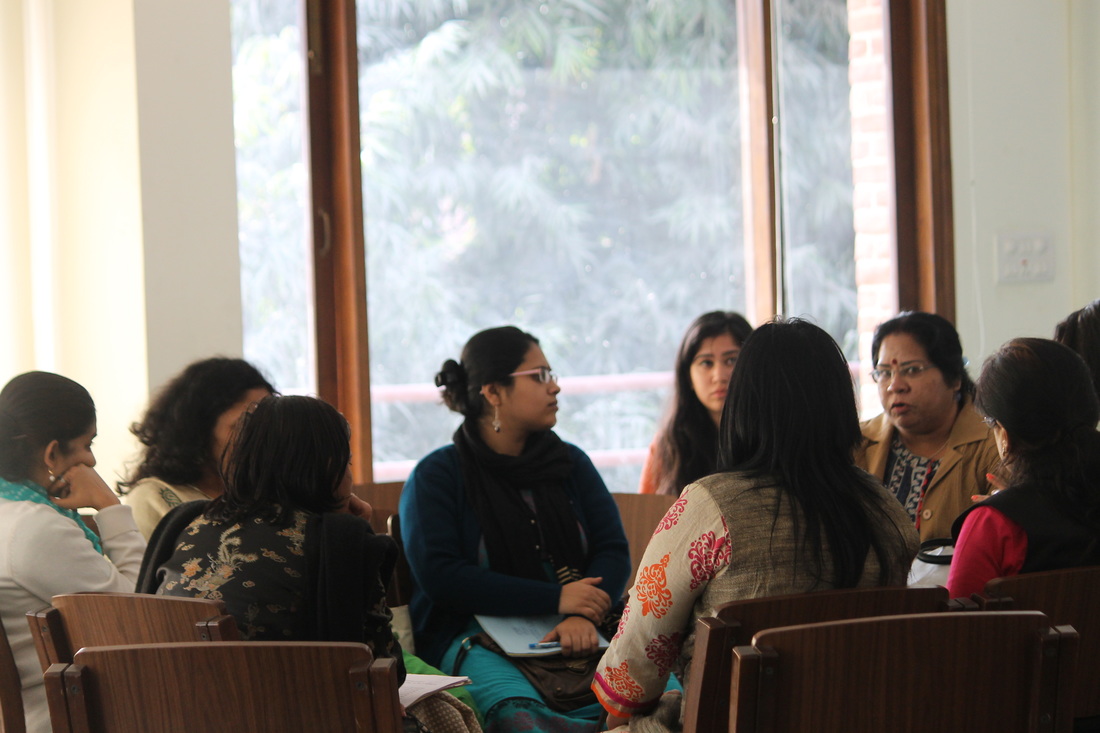|
The faculty and practitioner’s meet organised by Miranda House WDC was attended by a relatively smaller group but was much successful in creating a dialogue on intersectionalities and various gender issues relative to diverse aspects of the society.
Moderated by Bijayalaxmi Nanda of Miranda House the session was held on the third day of Gender Mela. Nanda called out for creating solidarities through this meet. She added that the Gender Mela could be held chapter wise as well, it was a good start but had limitations. She called for coming together and taking the issues forward with research in form of compendiums, written and oral focusing on specific case studies; e.g. a child sex ratio compendium. Vinita Bakshi, media person on women issues opined that they want to aim at a society which does not leave out the marginalized societies. She said that what makes human beings different from other species is culture. |
|
Do we attribute marginalization to culture, in which case to do away with marginalization would mean doing away with culture? She asked if culture is responsible for our status and what is the way forward. She added that we do not notice minute abuses like the abuses based on the private parts of women and even the blessings like, ‘Saubhagyavati Bhava’ or ‘Doodho nahao puto falo’. She said that it is necessary to question these as they are casting women in a mould that is numbifying.
Mansi Mishra, from Centre for Social Research, focused on pre natal sex selection and surrogacy. She questioned how girls are placed in the society. She brought attention to the fact that there is no training of practitioners from sex selection to ‘Beti Bachao, Beti Padhao’. She said there can be no empowerment if the people working on these issues don’t know the linkages and can’t get together to work as a team. She said there are pressures on the concerned authorities to show raised data on the number of girls going to school. The ratio in reality is not increasing. She also pointed out that the issue is not just about education; as in Haryana, where she works, people already send their children to school. Then what is this empowerment plan? She said that the parents ask what more can they do apart from send their children to school, to which there seems no answer under this scheme.
Talking about surrogacy she said that now it is being pushed towards a ban. Are we then aiming at an underground market? There is a tussle between Artificial Reproductive Technology (ART) and surrogacy now. She questioned what do we want in terms of sustainable development?
Researcher Sneha Banerjee said that there is a need to look critically at the work on surrogacy. How do we understand female body, technology and infertility? She urged to look at antenatal history. We want to control the reproductive aspects of a situation and it became an elite issue but is it? There is a need for a self-reflexive mode here. Industry does control the surrogate’s body but we need to disassociate from the ideology that sees women entirely as victims as did the first wave feminism in India. While making an argument for regulation of ART, it is important to keep in mind the alternate voices like the queer voices. Sexuality is subversive and it is important that a united voice does not exist. She called for a critical examination of solidarity. Is One Billion Raising representative of the same voices? Can feminism exist in isolation as a singular voice? Micro level studies also show the overlap of certain classes and castes, the how can so many voices on such huge level, as in One Billion Raising, be singular?
Nupur Rai, from the political science department of Kamla Nehru College, said she has worked on body and consent. She said there is a lot of limitation in the legal discourse on rights for women. Talking about sex work she said, “There is no criminalization but there is also no protection. Being a prostitute, what choices do I have? There is no exit policy from institutions such as prostitution or marriage. Then what choices do we really have?” She argued that the way women understand law and society depends on how they understand their bodies.
Babita Verma, from Laxmi Bai College, talked about the panchayat and political empowerment of women. Have women actually changed and become a part of the decision making process. She said the women who become sarpanch are mostly the oldest women in villages, the dais
(midwives) as she helped in the birthing process of most of the village, or the previous male sarpanch’s wife. In many areas people don’t know the name of the woman sarpanch and use her husband’s name in relation to refer to her. A study over a gap of a year showed that these women became more empowered over time as they became better informed. It was also important to lose jargons while talking about empowerment and resistance to these women. These women can identify discrimination but all that is required is to talk in their language.
The 73rd amendment has helped achieve this and make women understand the importance of education as well. She also pointed out that the concept of PradhanPati, where in it is claimed that in reality it is the husbands who rule in areas with a female sarpanch, is a myth. She said that husbands help too in campaigning, consulting and encouraging. Women in panchayats also need advice and there is nothing wrong if that advice comes from her family members. Male sarpanch would also need such support.
Rakhee Bakshee, from Women’s Feature Service, said they are a platform for all the researchers working on these issues and their struggles and welcomed the researchers to contribute and write for WFS. Kalpana, who is the author of Love Forever @ Rajpath is also a government employee and works on gender sensitization at work place. Her book also focuses on Jabariya shadi (forced marriage/ groom kidnapping) and sanitation.
Nanda said that it is important to see a link between all these various issues and build solidarities. We can see how we have had some male support too as was seen in the argument about Pradhan Patis.
Bakshee said that a woman’s body has never been her own. While making an argument for legalization of sex work it is important to question if that income will be taxable then. Rai added that if it is legalized there would be a contract but for e.g. in Germany there is legal sex work yet they have no dignity. There is a need to question the demand and not just the supply.
Banerjee called for problematizing dignity. She said let us not only use this word for professions related to the body. She said let us not have a moralistic eye as for some women choosing sex work over contractual work or domestic work can be a better choice for several reasons such as long work hours and minimal payment.
Rai added that it is important to delink institutional sex work from brothel based work. The sex workers want their kids out of this industry, they have very few earning years in this profession and the regularity of violence is huge. Critical look at the demand and invisibility of customers is required. She said we have to debunk the structure but regulate the practice, as it is not just a working condition issue as is the case with other types of contractual work.
Nanda pointed out that it is important to know the views of a practitioner as well as researchers as that can paint a holistic picture. Mishra said with the education and empowerment of women, the demand for earning wives is going up. She also pointed out how can women make informed choices if they don’t know about technology and enter surrogacy. There is also a lack of social security for these women. How can we ensure their safety when they are forced to give birth to four children? She shared that case studies show that there are more Muslim women in the surrogacy business as they are considered ‘more fertile’. This thought process exists as Muslim women are generally married off at a young age and have more children at a young age.
Nanda said it is very difficult to work on choice in India. The Pre-Conception and Pre-Natal Diagnostic Techniques (PCPNDT) Act, 1994 is being used in the west to further the anti-abortion agenda.
Bakshee asked to also look at the invisible women who work from home and are involved in various types of work.
Kalpana, talking about the blessings, said that she pointed this out to her husband after marriage while she was being given sexist blessings and her husband did tell all the relatives to make a change in the way they blessed her. She said even though a small effort, these are the incidents that bring us to the point of MenEngage.
Mishra suggested that it is important to include male officers at the grassroots level in gender sensitization programmes as it makes a lot of difference.
Verma also added that she has seen sexism even in the lullabies sung to children and has made an effort to challenge those at a personal level. Nanda ended the session by requesting for another such meet that could lead to some collaborative research that can help researchers and practitioners from various fields equally.
Mansi Mishra, from Centre for Social Research, focused on pre natal sex selection and surrogacy. She questioned how girls are placed in the society. She brought attention to the fact that there is no training of practitioners from sex selection to ‘Beti Bachao, Beti Padhao’. She said there can be no empowerment if the people working on these issues don’t know the linkages and can’t get together to work as a team. She said there are pressures on the concerned authorities to show raised data on the number of girls going to school. The ratio in reality is not increasing. She also pointed out that the issue is not just about education; as in Haryana, where she works, people already send their children to school. Then what is this empowerment plan? She said that the parents ask what more can they do apart from send their children to school, to which there seems no answer under this scheme.
Talking about surrogacy she said that now it is being pushed towards a ban. Are we then aiming at an underground market? There is a tussle between Artificial Reproductive Technology (ART) and surrogacy now. She questioned what do we want in terms of sustainable development?
Researcher Sneha Banerjee said that there is a need to look critically at the work on surrogacy. How do we understand female body, technology and infertility? She urged to look at antenatal history. We want to control the reproductive aspects of a situation and it became an elite issue but is it? There is a need for a self-reflexive mode here. Industry does control the surrogate’s body but we need to disassociate from the ideology that sees women entirely as victims as did the first wave feminism in India. While making an argument for regulation of ART, it is important to keep in mind the alternate voices like the queer voices. Sexuality is subversive and it is important that a united voice does not exist. She called for a critical examination of solidarity. Is One Billion Raising representative of the same voices? Can feminism exist in isolation as a singular voice? Micro level studies also show the overlap of certain classes and castes, the how can so many voices on such huge level, as in One Billion Raising, be singular?
Nupur Rai, from the political science department of Kamla Nehru College, said she has worked on body and consent. She said there is a lot of limitation in the legal discourse on rights for women. Talking about sex work she said, “There is no criminalization but there is also no protection. Being a prostitute, what choices do I have? There is no exit policy from institutions such as prostitution or marriage. Then what choices do we really have?” She argued that the way women understand law and society depends on how they understand their bodies.
Babita Verma, from Laxmi Bai College, talked about the panchayat and political empowerment of women. Have women actually changed and become a part of the decision making process. She said the women who become sarpanch are mostly the oldest women in villages, the dais
(midwives) as she helped in the birthing process of most of the village, or the previous male sarpanch’s wife. In many areas people don’t know the name of the woman sarpanch and use her husband’s name in relation to refer to her. A study over a gap of a year showed that these women became more empowered over time as they became better informed. It was also important to lose jargons while talking about empowerment and resistance to these women. These women can identify discrimination but all that is required is to talk in their language.
The 73rd amendment has helped achieve this and make women understand the importance of education as well. She also pointed out that the concept of PradhanPati, where in it is claimed that in reality it is the husbands who rule in areas with a female sarpanch, is a myth. She said that husbands help too in campaigning, consulting and encouraging. Women in panchayats also need advice and there is nothing wrong if that advice comes from her family members. Male sarpanch would also need such support.
Rakhee Bakshee, from Women’s Feature Service, said they are a platform for all the researchers working on these issues and their struggles and welcomed the researchers to contribute and write for WFS. Kalpana, who is the author of Love Forever @ Rajpath is also a government employee and works on gender sensitization at work place. Her book also focuses on Jabariya shadi (forced marriage/ groom kidnapping) and sanitation.
Nanda said that it is important to see a link between all these various issues and build solidarities. We can see how we have had some male support too as was seen in the argument about Pradhan Patis.
Bakshee said that a woman’s body has never been her own. While making an argument for legalization of sex work it is important to question if that income will be taxable then. Rai added that if it is legalized there would be a contract but for e.g. in Germany there is legal sex work yet they have no dignity. There is a need to question the demand and not just the supply.
Banerjee called for problematizing dignity. She said let us not only use this word for professions related to the body. She said let us not have a moralistic eye as for some women choosing sex work over contractual work or domestic work can be a better choice for several reasons such as long work hours and minimal payment.
Rai added that it is important to delink institutional sex work from brothel based work. The sex workers want their kids out of this industry, they have very few earning years in this profession and the regularity of violence is huge. Critical look at the demand and invisibility of customers is required. She said we have to debunk the structure but regulate the practice, as it is not just a working condition issue as is the case with other types of contractual work.
Nanda pointed out that it is important to know the views of a practitioner as well as researchers as that can paint a holistic picture. Mishra said with the education and empowerment of women, the demand for earning wives is going up. She also pointed out how can women make informed choices if they don’t know about technology and enter surrogacy. There is also a lack of social security for these women. How can we ensure their safety when they are forced to give birth to four children? She shared that case studies show that there are more Muslim women in the surrogacy business as they are considered ‘more fertile’. This thought process exists as Muslim women are generally married off at a young age and have more children at a young age.
Nanda said it is very difficult to work on choice in India. The Pre-Conception and Pre-Natal Diagnostic Techniques (PCPNDT) Act, 1994 is being used in the west to further the anti-abortion agenda.
Bakshee asked to also look at the invisible women who work from home and are involved in various types of work.
Kalpana, talking about the blessings, said that she pointed this out to her husband after marriage while she was being given sexist blessings and her husband did tell all the relatives to make a change in the way they blessed her. She said even though a small effort, these are the incidents that bring us to the point of MenEngage.
Mishra suggested that it is important to include male officers at the grassroots level in gender sensitization programmes as it makes a lot of difference.
Verma also added that she has seen sexism even in the lullabies sung to children and has made an effort to challenge those at a personal level. Nanda ended the session by requesting for another such meet that could lead to some collaborative research that can help researchers and practitioners from various fields equally.



